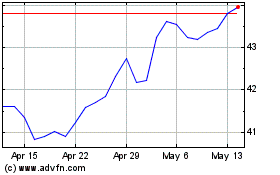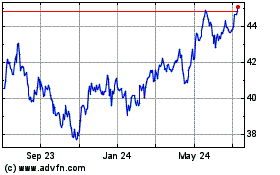Vanguard Chops More ETF Fees -- WSJ
February 27 2019 - 3:02AM
Dow Jones News
Money manager takes aim at funds that invest in international
assets
By Asjylyn Loder
This article is being republished as part of our daily
reproduction of WSJ.com articles that also appeared in the U.S.
print edition of The Wall Street Journal (February 27, 2019).
Vanguard Group is cutting management fees on 10 exchange-traded
funds, the latest money manager to trim fees on a host of
investment products.
The ETFs, with combined assets of $176 billion, include funds
that invest in international stocks and bonds. The biggest is the
$63 billion Vanguard FTSE Emerging Markets ETF, which will cost $12
a year for every $10,000 invested. That is down from $14, making it
cheaper than a competing ETF from BlackRock Inc.'s iShares Core
lineup. In addition, 43 Vanguard mutual funds are also reducing
fees.
The price cuts were disclosed in new regulatory filings
Tuesday.
"A broader and broader base of investors are using ETFs, and
that's pushing more assets into these funds," said Rich Powers,
head of ETF product management at Vanguard. As the funds grow,
economies of scale allow Vanguard to pass savings along to
investors, he said.
Vanguard's move is the latest in an escalating fee war in ETFs,
where the cheapest funds typically raise the most money. Filings
due within the next week for eight other Vanguard ETFs, with a
total of almost $440 billion in assets, could show additional fee
cuts.
The price war is going well beyond ETF-management costs and into
a host of other investment products. Vanguard has been at the
forefront of the trend for decades, continually cutting the costs
of investing. The focus on lower fees has made the money-management
giant in the Philadelphia suburb of Malvern the second-largest
asset manager in the world.
Vanguard's success has forced its competitors to match its
ultralow prices, a trend often called "the Vanguard effect."
Last year, Fidelity Investments grabbed headlines by introducing
a zero-fee lineup of mutual funds, kindling speculation that a free
ETF wouldn't be far behind.
Online lender Social Finance Inc. said Monday it planned to
start the first zero-fee ETFs. But there's catch: The fees are only
being waived for the first year. After that, they could rise to $19
a year for every $10,000 invested, the filing shows.
The cheapest U.S. stock ETFs now cost $3 to $4 a year for every
$10,000 invested.
The price paid for index funds that invest in big U.S. companies
barely budged in 2018, but there remains steady competition in
segments like bonds and emerging markets, according to a report
earlier this month from Morningstar.
The price wars also have expanded into new areas of asset
management, like advice and brokerage. Earlier this month, Charles
Schwab Corp. and Fidelity Investments doubled the number of ETFs
that are exempt from trading commissions on their brokerage
platforms.
To be sure, management fees aren't the only factor investors use
when choosing a fund. They also have to factor in tax implications,
trading costs and fund strategy. Vanguard's emerging markets ETF
doesn't include South Korean stocks -- unlike the competing iShares
funds -- because the funds follow different index
methodologies.
Investors also have shown a willingness to pay a little more for
index strategies that try to smooth out market turbulence or pick
the best-run companies.
Write to Asjylyn Loder at asjylyn.loder@wsj.com
(END) Dow Jones Newswires
February 27, 2019 02:47 ET (07:47 GMT)
Copyright (c) 2019 Dow Jones & Company, Inc.
Vanguard FTSE Emerging M... (AMEX:VWO)
Historical Stock Chart
From Oct 2024 to Nov 2024

Vanguard FTSE Emerging M... (AMEX:VWO)
Historical Stock Chart
From Nov 2023 to Nov 2024
